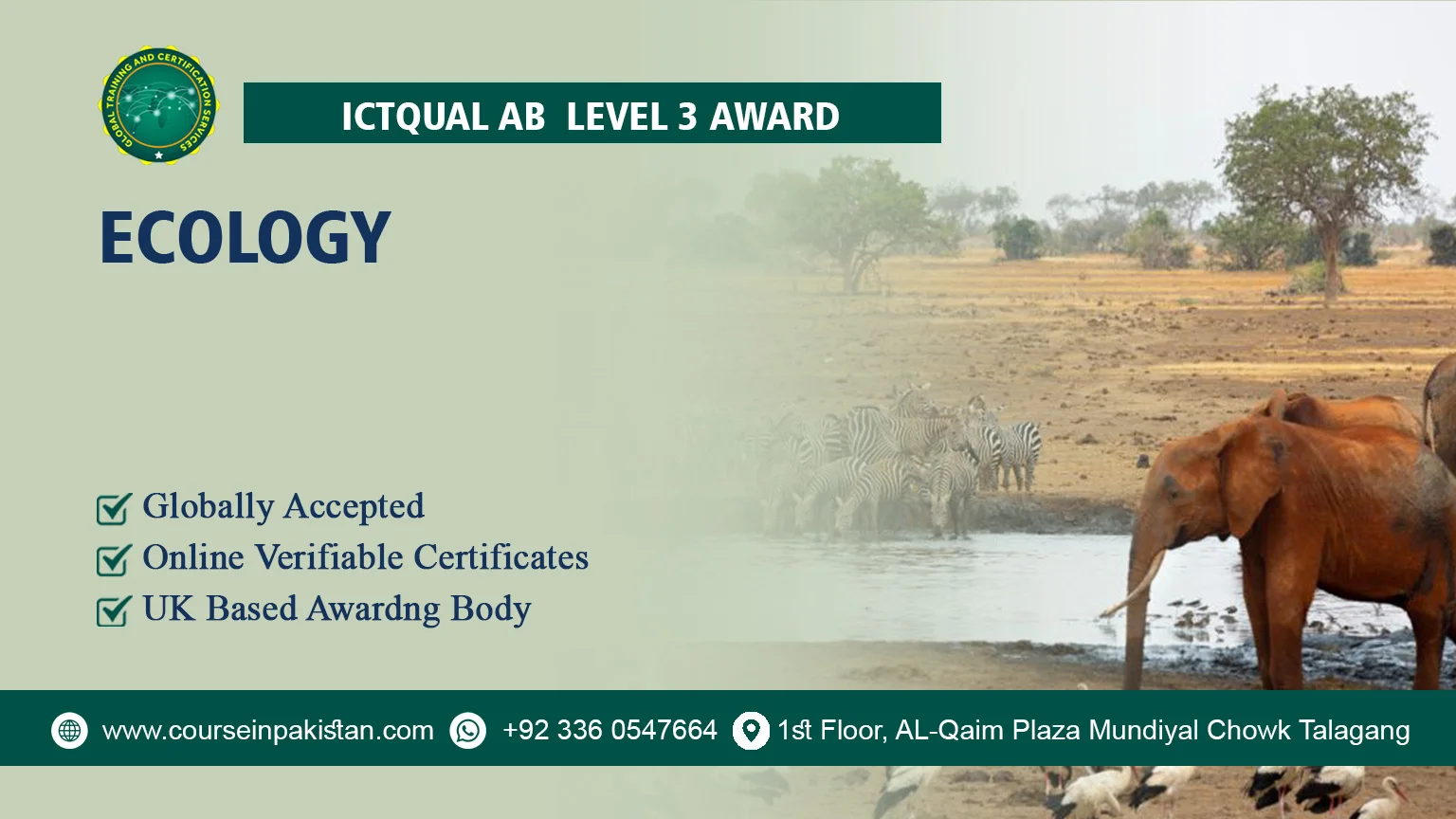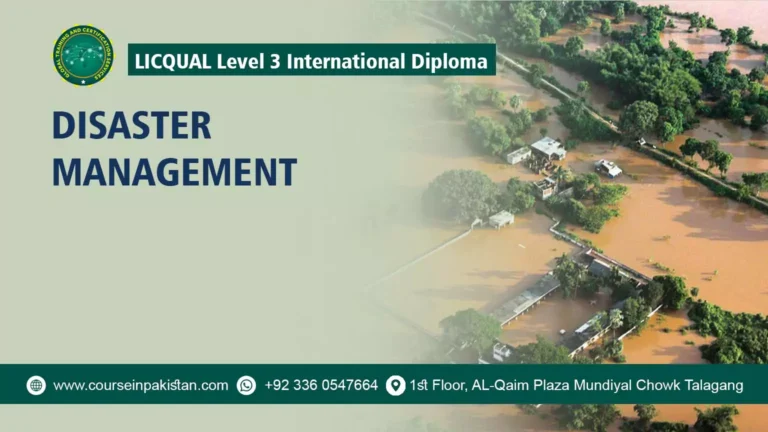
ICTQual level 3 Award in Ecology
Are you fascinated by the intricate web of life and ecosystems? The Level 3 Award in Ecology offers an enriching journey into the study of natural environments, biodiversity, and ecological processes. Whether you’re an aspiring ecologist, conservationist, or simply someone passionate about understanding and protecting our natural world, this course provides a solid foundation in ecological principles and practices.
Course Introduction
The Level 3 Award in Ecology delves into the fundamental concepts and methodologies used in the study of ecosystems and biodiversity. Participants will explore the interactions between organisms and their environment, ecological dynamics, and the impact of human activities on natural habitats. This qualification is designed to equip learners with the knowledge and skills needed to contribute to conservation efforts and sustainable environmental management.
Course Overview
Throughout this course, participants will engage in theoretical studies and practical fieldwork to gain insights into ecological principles and practices. Emphasis is placed on understanding ecological relationships, conducting habitat surveys, and interpreting ecological data. The course integrates scientific inquiry with environmental stewardship, preparing learners to address contemporary ecological challenges with evidence-based solutions.
Course Benefits
- Comprehensive Understanding: Gain in-depth knowledge of ecological concepts, biodiversity, and ecosystem dynamics.
- Career Advancement: Enhance your employability in ecological consultancy, conservation organizations, research institutions, and governmental agencies.
- Fieldwork Experience: Develop practical skills through field surveys, data collection, and ecological monitoring.
- Environmental Impact: Contribute to biodiversity conservation and habitat restoration initiatives through informed ecological management practices.
Course Study Units
The Level 3 Award in Ecology covers essential topics, including:
- Introduction to Ecology
- Biodiversity and Species Conservation
- Habitat Ecology and Management
- Ecological Surveys and Monitoring
- Community Ecology and Interactions
- Conservation Biology Principles
- Applied Ecology and Human Impacts
- Ecological Research and Data Analysis
- Environmental Policy and Conservation Advocacy
Learning Outcomes
Study Unit: Introduction to Ecology
- Learning Outcomes:
- Explain fundamental ecological concepts, such as ecosystems, biomes, and ecological niches.
- Describe the principles of energy flow and nutrient cycling in ecosystems.
- Analyze the factors influencing population dynamics and community structure.
Study Unit: Biodiversity and Species Conservation
- Learning Outcomes:
- Define biodiversity and its importance for ecosystem health and resilience.
- Evaluate threats to biodiversity, including habitat loss, invasive species, and climate change.
- Propose strategies and interventions for biodiversity conservation and species recovery.
Study Unit: Habitat Ecology and Management
- Learning Outcomes:
- Identify different types of habitats and their ecological characteristics.
- Apply habitat management techniques to enhance biodiversity and ecosystem services.
- Assess the effectiveness of habitat restoration and conservation efforts.
Study Unit: Ecological Surveys and Monitoring
- Learning Outcomes:
- Plan and conduct ecological surveys using appropriate sampling techniques.
- Collect and analyze ecological data to assess species abundance, distribution, and diversity.
- Interpret survey results to draw conclusions about ecosystem health and management needs.
Study Unit: Community Ecology and Interactions
- Learning Outcomes:
- Describe the structure and dynamics of ecological communities.
- Analyze species interactions, such as competition, predation, and mutualism.
- Evaluate the role of keystone species and trophic cascades in ecosystem stability.
Study Unit: Conservation Biology Principles
- Learning Outcomes:
- Discuss the principles and goals of conservation biology.
- Apply genetic, population, and landscape approaches to conservation planning.
- Critically assess conservation strategies and their implications for biodiversity conservation.
Study Unit: Applied Ecology and Human Impacts
- Learning Outcomes:
- Evaluate the ecological impacts of human activities, such as urbanization, agriculture, and resource extraction.
- Propose sustainable practices and mitigation measures to minimize environmental degradation.
- Advocate for policies and practices that promote sustainable development and biodiversity conservation.
Study Unit: Ecological Research and Data Analysis
- Learning Outcomes:
- Design ecological research projects, including hypothesis formulation and experimental design.
- Collect, analyze, and interpret ecological data using statistical methods and software.
- Communicate research findings effectively through scientific reports and presentations.
Study Unit: Environmental Policy and Conservation Advocacy
- Learning Outcomes:
- Explain the role of environmental policies and regulations in biodiversity conservation.
- Advocate for conservation initiatives and policies that promote ecosystem resilience and sustainability.
- Engage with stakeholders and policymakers to influence environmental decision-making processes.
These learning outcomes provide a comprehensive framework for developing expertise in ecology, biodiversity conservation, and environmental management. They equip learners with the knowledge and skills necessary to contribute effectively to ecological research, conservation efforts, and sustainable environmental practices.
Who Is This Course For?
The Level 3 Award in Ecology is suitable for:
- Aspiring Ecologists: Seeking to develop expertise in the study and conservation of ecosystems.
- Conservationists: Interested in applying ecological principles to protect and restore natural habitats.
- Environmental Consultants: Involved in ecological assessments and environmental impact studies.
- Students and Researchers: Eager to explore career opportunities in ecology, biodiversity conservation, and environmental science.
Future Progression for This Course
Upon completing the Level 3 Award in Ecology, learners can progress to:
- Level 4 Certificate/Diploma in Ecology: Further specialization in specific areas such as wildlife management, ecosystem restoration, or ecological research.
- Higher Education: Pursue advanced studies in ecology, conservation biology, or related fields at universities or research institutions.
- Professional Development: Attend workshops, gain certifications, or participate in internships to enhance practical skills and career prospects in ecological science.
The Level 3 Award in Ecology offers a gateway to exploring and understanding the complex dynamics of ecosystems and biodiversity. Whether you aspire to contribute to conservation efforts, conduct ecological research, or advocate for sustainable environmental practices, this course provides the knowledge and skills necessary to make a positive impact on our natural world. Ready to embark on a journey of discovery and conservation? Enroll in the Level 3 Award in Ecology and become a steward of ecological sustainability and biodiversity preservation.






